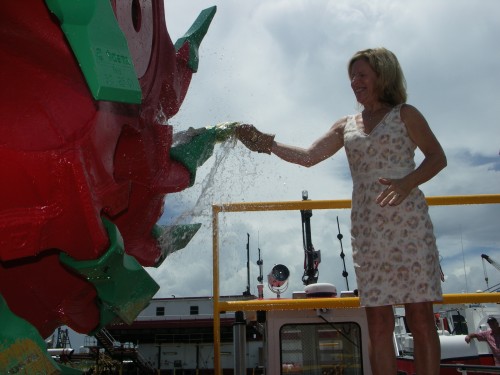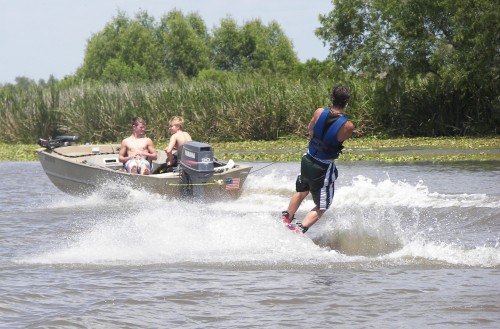
Vessel launches new standard
July 18, 2012
China trip changes some opinions on local trade deal
July 18, 2012The number of boaters hitting area waterways continues to climb alongside summer temperatures, and those on the water should take the necessary precautions when making waves.
“I’d bet 1,000 boats cross this lake on the weekend,” said Sgt. Ted Dewitt with the Louisiana Department of Wildlife and Fisheries as he and Senior Agent Thomas Wolf conducted boating safety patrols near Lake Decade. “With all the camps that line the canals in the area, this is a high boating traffic area.”
LDWF regularly patrols the local waters in full force to conduct safety and boating-while- intoxicated checks, especially on weekends and holidays.
Lake Decade is also the location of a popular spot known as the Cajun Bahamas. The area has a shallow sandy bottom and, with the right weather, is a boat parking lot where people pull up, hop out, hang out and swim. “Lake Decade has been a hot spot for boating since the dinosaurs,” Dewitt said, chuckling.
The pair’s afternoon patrol started at 1:30 p.m. in the Company Canal between Houma and Lockport, another popular spot for boaters where tubes, kneeboards and skis are de rigueur for water play.
Dewitt and Wolf stopped several boats pulling skiers and tubers, many between the ages of 17 to 25 and several parents with children, along the waterway to check for life jackets and current registration.
“Life jacket violations are the top violation and our main concern,” Wolf said. “Juveniles must wear life jackets until they are 16 when under way in vessels less than 26 feet long. It was changed from 13 a few years ago, and not many people realize that. We are also checking for up-to-date boat registration information and game.”
In Louisiana, boats must have a personal flotation device or life jacket on board for all occupants.
“Personal flotation devices are made to be worn and not sit in a vessel storage compartment,” LDWF Boating Safety Officer Capt. Rachel Zechenelly said in a printed release. “Even if you consider yourself to be a strong swimmer, LDWF still encourages everyone on a boat to wear a personal flotation device whenever the boat is in motion. A personal flotation device on a boat should be treated the same as a seatbelt in a car, because they are both easy to use and are proven to save lives.”
According to LDWF boating incident statistics, 19 of the state’s 36 boating fatalities in 2011 were drownings, and these accidents could have been prevented by the use of a life jacket.
“One afternoon, I had to write citations to all five boats of a local fishing charter service,” Wolf said as he steered the boat closer to the entrance of Lake Fields. “We asked them to show us their life jackets, and they had them stowed in cabinets with twist locks. It took them 10 minutes to get the life jackets out. Boaters still need to have these readily accessible even if they are in a boat large enough to not require passengers to wear a life jacket while under way.”
Boaters should exercise even more caution when fishing offshore, a popular type of fishing for many in the area.
“Although weather can have a significant impact on safe boating in protected waters, offshore fishing presents even greater hazards due to the potential for larger, more powerful waves impacting the hull of a vessel which could cause capsizing or sinking,” Zechenelly said.
While coasting down Company Canal, Dewitt observed three young men they had just checked for life jackets kicking up water very close to another boat.
“I just saw you guys spray that boat, and there was another boat trying to get by on the other side as well,” Dewitt said. “Keep it three boats wide when you are passing and don’t spray other boaters. What if you had flown off the board and into those people’s boat?”
At the entrance to Lake Fields, Wolf waved a boat with two older gentlemen over.
Before Dewitt could point out the boater’s violation – no life jacket while operating a tiller-handled boat less than 16 feet – the driver admitted he was in the wrong.
“Guilty as charged,” said Patrick Porche of Thibodaux as Dewitt grabbed on to the side of his boat. Porche and his passenger were headed to camp and were toting clothes and a push mower in their boat.
“We’re going to issue you a warning, sir,” Wolf said at he collected the man’s information. “You don’t have any other violations with us.”
When operating a tiller-handled boat that is less than 16 feet long, all occupants of the boat, regardless of age, must be wearing a life jacket, and the driver must also have the kill switch attached to their person.
“Most of our fatalities involve tiller-handled boats,” Dewitt said. “They make a death circle when the driver is tossed out. They don’t go straight like a center console.”
Dewitt’s boating fatality observations echoed that of LDWF Lt. Col. Jeff Mayne, state boating law administrator.
“One of the best parts of our job is to see people utilize Louisiana’s waterways for recreation in accordance to the boating safety regulations and return home safely to loved ones. However, the worst part of our job is to search for deceased bodies and notify family members of their loss,” Mayne said in a printed statement. “The two ways to make boating safe, fun and a memorable experience is to have a sober operator and to have everyone wear a personal flotation device when the vessel is under way.”
Wolf recalled an accident several years ago when a boater was thrown from a tiller-handled boat.
“He was in a canal, and when we responded to the scene, he was OK, but his boat was doing circles in the canal,” Wolf said. “Every time it would get close to one of the banks and we hoped it would stop, it would just rotate back into the middle of the canal. The guy had just filled up the 30-gallon tank on the boat and it could have run there for a while. Finally, we just threw a rope down by the propeller, and it tangled in the prop and stopped the boat.”
After checking a few more boaters in the area, Wolf whipped the boat around and pointed the bow toward the Intracoastal Waterway, eventually hooking the boat back into another canal that took the agents south toward Lake Decade. Traffic on the canal was steady, and the pair made a few more stops, mostly boaters headed out to drop their lines.
“Where are the fish biting?” called out one boater as he pulled away.
“Down by the beaches and islands,” Wolf shouted back, laughing.
Choppy waters greeted the agents when they reached Lake Decade, and very few boats buzzed across the lake.
“Just like Lake Fields, pretty quiet,” Dewitt said. “We haven’t had many problems here lately. People have been behaving. We sometimes check 100 boats and don’t write a thing. Boaters are starting to get the picture when it comes to safety.”
In addition to the areas the agents were patrolling, Lake Salvador and Grand Isle are also local high-traffic boating areas.
“We don’t have too many boating safety problems offshore,” Dewitt said. “People who fish regularly offshore are usually a little more up to speed on safety.”
After making several safety checks of boats cruising across the lake, Wolf idled the boat into a canal that serves as a main thoroughfare and he and Dewitt took a break into share safety tips.
“Before you head out on the water, let someone know what launch you are leaving from, where you are headed and when you expect to be back,” Dewitt said. “Knowing where you launched from is the most important thing if something happens. We will look for your vehicle first. If it’s still there, maybe you stopped at someone’s camp on the way back and, if not, we have a general idea of where to start looking.”
“I stress general courtesy to other boaters,” Wolf said. “When you see a boat has swimmers in the water, slow down. Slow to pass each other, too. Pay attention. General courtesy and paying attention go a long way on the water. Use some common sense and attentiveness.”
Boaters should look out for and observe no wake zones.
“Watch for wakes where camps have boats docked,” Dewitt said. “If you make boats crash together, you are responsible for your wake and any damage you cause. If law enforcement gets a call because someone got your boat numbers, the authorities will come looking for you.”
Several boaters passing through the channel should have pulled up to listen to Dewitt and Wolf’s advice – the majority of boaters who passed as the agents had other boats pulled over didn’t even bother to slow down.
By 5 p.m., traffic through the area had slowed to nil, and Wolf breezed the boat past the Dularge Bridge on Falgout Canal and into to the Houma Navigational Canal. As Wolf turned into the Intracoastal Waterway, Dewitt spotted two individuals leaning over their boat’s motor as it drifted in the middle of the waterway.
“How you guys doing today?” Dewitt asked.
“Not too good,” the boat’s driver said. “I just put the motor on this boat today.”
“How many beers have you guys had today?” Dewitt asked as he noted several beer cans in the boat.
After a few minutes of questioning, Dewitt asked the boat’s driver, Kevin James Dupre, 31, of 244 Orange Street in Dulac, to step over into the agency’s boat for a field sobriety test, which the driver failed.
“We’re going to tow your boat to the nearest dock and someone who has not been drinking is going to have to come and get it,” Dewitt explained to Dupre. “From there, we are going to take you to the station for a Breathalyzer test.”
In 2011, LDWF issued 108 DWIs on the water. According to the department, alcohol consumption impairs a boater’s judgment, balance, vision and reaction time and increases fatigue and vulnerability to hypothermia. The affects of the alcohol are also multiplied when sun, wind, noise, vibration and movement are considered.
Penalties for DWIs on the water are the same as on the road, and those cited can lose their driver’s license and boating privileges.
“We rarely make arrests when conducting boating safety checks, but most of them are DUIs,” Wolf said. “Ten a year is the average number of boating safety arrests for an agent.”
Dewitt can add Dupre to his list of arrests – after failing a Breathalyzer test, which measured twice the legal limit, Dupre was booked for DWI.
Boaters wake board on Company Canal near Lockport. According to the Louisiana Department of Wildlife and Fisheries, the area is also a popular for tubing and hydrosliding activities.











